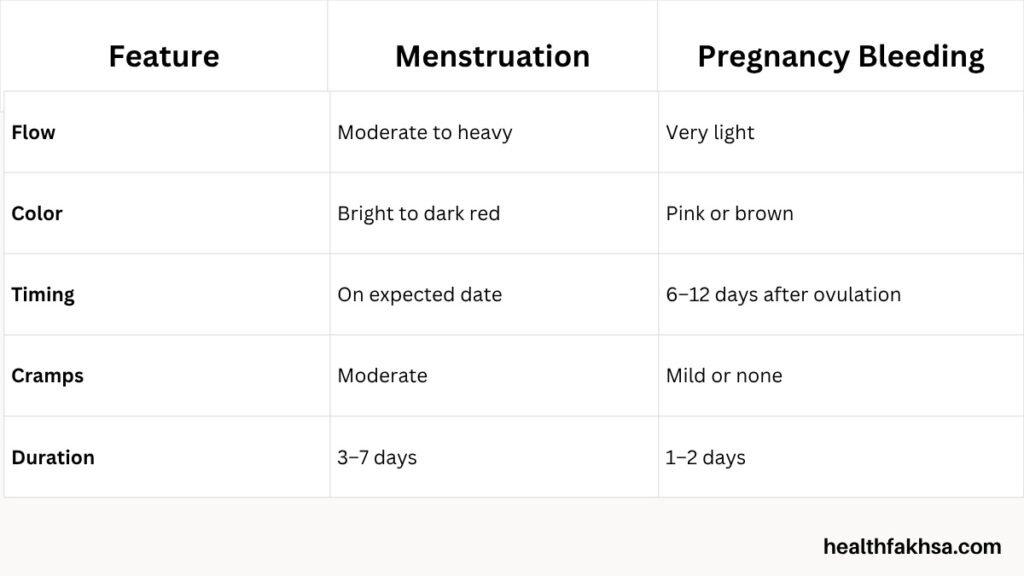You’re staring at the calendar, confused. Your period is here—or is it? It’s lighter than usual, maybe earlier too. A part of you wonders: could I be pregnant?
This moment of uncertainty is more common than most women realize. Understanding the difference between menstruation and pregnancy bleeding can ease anxiety and help you take the right next steps.
Let’s break it down.
Why This Bleeding Feels Different
That odd spotting, unexpected flow, or weird timing? It can feel like your body is trying to whisper something. For many women, the line between a light period and early pregnancy bleeding is blurry—until you know what to look for. That’s where this guide comes in.
The Difference Between Menstruation and Pregnancy Bleeding — Explained
The difference between menstruation and pregnancy bleeding lies in timing, flow, color, and symptoms. While a normal period involves shedding the uterine lining due to a lack of pregnancy, pregnancy bleeding (like implantation bleeding) happens when a fertilized egg attaches to the uterine wall.
The tricky part? They can feel similar. So, we’re digging into the details.
What Is Menstruation, Really?
- Happens roughly every 28 days if you’re not pregnant
- Flow is moderate to heavy
- Typically lasts 3–7 days
- Accompanied by cramps, bloating, mood changes
Menstruation is your body’s way of clearing out the uterine lining when pregnancy doesn’t occur.
What Is Pregnancy Bleeding? Is It Normal?
Pregnancy bleeding often refers to implantation bleeding:
- Light spotting, usually pink or brown
- Happens 6–12 days after conception
- May last a few hours or 1–2 days
It’s normal for some women and one of the earliest signs of pregnancy. But it should never be heavy, bright red, or prolonged.
Other possible causes of early pregnancy bleeding include:
- Cervical changes (from increased blood flow)
- Hormonal shifts
- Rarely, complications like ectopic pregnancy or miscarriage
Spot the Signs: Difference Between Menstruation and Pregnancy Bleeding
Flow
- Period: Heavy or consistent
- Pregnancy bleeding: Light spotting only
Color
- Period: Bright to dark red
- Pregnancy: Pink, light brown
Timing
- Period: On or close to expected date
- Pregnancy: Usually earlier than period
Cramps
- Period: Moderate to strong
- Pregnancy: Mild or absent
Duration
- Period: 3–7 days
- Pregnancy: 1–2 days
What Causes Pregnancy Bleeding in Early Weeks?
Not all pregnancy bleeding is bad. Early signs can include:
- Implantation bleeding (when embryo attaches to uterus)
- Hormone shifts causing minor discharge
- Cervical irritation (after sex or a vaginal exam)
But always call your doctor if bleeding is:
- Bright red
- Heavy
- Accompanied by pain or dizziness
When Should You Take a Pregnancy Test or Call a Doctor?
Take a test if:
- You had unprotected sex in the last 2 weeks
- Your “period” is lighter, shorter, or oddly timed
- You’re experiencing nausea, sore breasts, or fatigue
Call your doctor if:
- You’ve tested positive and are bleeding
- You feel weak, faint, or have cramps on one side
The bleeding lasts more than 2 days or worsens.
Period or Implantation? Side-by-Side Comparison Table

💬 FAQs
Is implantation bleeding always light?
Yes. It should be minimal, lasting only a day or two. Heavy or prolonged bleeding isn’t typical and should be evaluated.
Can you have heavy bleeding and still be pregnant?
It’s rare. Heavy bleeding may indicate complications like miscarriage or ectopic pregnancy. Always consult your doctor.
Does pregnancy bleeding come with cramps?
Sometimes, but cramps are usually mild and shorter in duration compared to menstrual cramps.
How early can implantation bleeding happen?
Usually 6–12 days after ovulation or conception—often around the time your period would be due.
Bottom Line:
Bleeding of any kind can be stressful when pregnancy is even a remote possibility. But now you know the signs. Whether it’s spotting or a full flow, your body is giving you clues. And you deserve answers that empower, not confuse.
When in doubt, test. When still unsure, call your doctor. Every body is unique—which is why learning the difference between menstruation and pregnancy bleeding helps you recognize what’s normal for you.
You know your body best.

